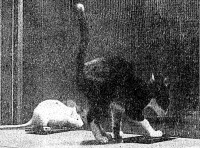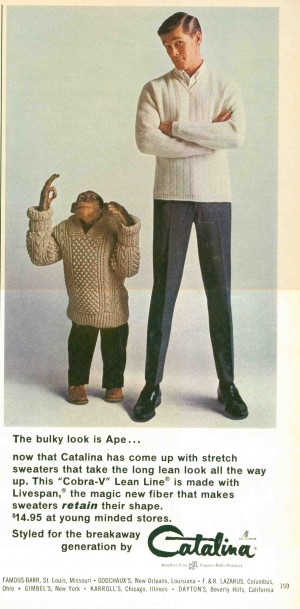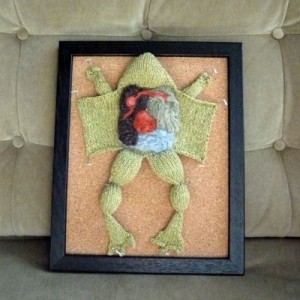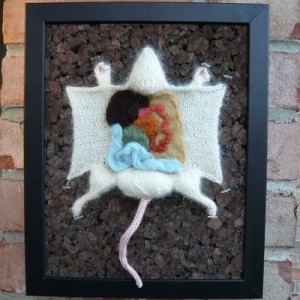Animals
Cat-Rat Cooperation Disproves Darwin
 Chuck's post last week about the guy who trained a rat to sit on top of a cat sitting on a dog, reminded me of the groundbreaking research of Dr. Loh Seng Tsai, conducted back in the late 1940s/early 1950s.
Chuck's post last week about the guy who trained a rat to sit on top of a cat sitting on a dog, reminded me of the groundbreaking research of Dr. Loh Seng Tsai, conducted back in the late 1940s/early 1950s.Dr. Tsai trained a cat and a rat to cooperate together in order to get food. From the LA Times, July 15, 1951:
To get into the third section, where a dish of food awaits, the cat and mouse must each step on a floor button simultaneously. When this is done by perfect cooperation the gate drops and both animals thus gain admittance to the food chamber.
Dr. Tsai reported that, "Soon all the pairs of cats and rats began to work together. Finally their cooperation was so perfect that they took only three seconds to reach their food from the entrance."
Dr. Tsai figured that these results disproved Darwin's concept of the Survival of the Fittest. He told the LA Times reporter: "In the face of the fact that even alley cats and rats live together, eat together, sleep together, play together and work together, Darwin's theory seems at most only a half-truth."
What's really amazing is that this guy was a professor of biology at first the University of Chicago, then Tulane, then UCLA, and yet he didn't seem to have a clear understanding of what Darwin meant by the Survival of the Fittest. Nor, as far as I can tell, did anyone ever call him out as a crackpot. In fact, there was talk of nominating him for the Nobel Peace Prize.
Posted By: Alex - Tue Dec 23, 2008 -
Comments (6)
Category: Animals, Science, Experiments
Dr. Dove’s Unicorn Bull
 In 1933 Dr. W.F. Dove, a biologist at the University of Maine, conducted an experiment to find out if he could create a "unicorn bull." He removed the two knots of tissue on the side of the bull's head that would normally have developed into horns and transplanted them to the center of the forehead. The experiment was a success. A single, massive horn grew there.
In 1933 Dr. W.F. Dove, a biologist at the University of Maine, conducted an experiment to find out if he could create a "unicorn bull." He removed the two knots of tissue on the side of the bull's head that would normally have developed into horns and transplanted them to the center of the forehead. The experiment was a success. A single, massive horn grew there. The unicorn horn made the bull the unchallenged leader of its herd. But Dr. Dove observed that the unicorn bull was actually an extremely docile creature. He wrote:
Link: Unicorn Garden
Posted By: Alex - Wed Dec 17, 2008 -
Comments (5)
Category: Animals, Science, Experiments, 1930s
New Smokey the Bear PSA
Remember our earlier post, VISION IN THE FOREST, where Smokey the Bear appeared to a young girl during the 1950's?Well, the new Smokey PSA is disturbing in its own fashion, as it promotes the notion that any of us could turn into a bear at any time.
Maybe they were inspired by an earlier version that follows second here.
Posted By: Paul - Tue Dec 16, 2008 -
Comments (5)
Category: Animals, Body Modifications, PSA’s, Surrealism
Peace on Earth
Mankind replaced by squirrels? See it all in this famous cartoon.
Posted By: Paul - Sat Dec 13, 2008 -
Comments (2)
Category: Animals, Armageddon and Apocalypses, Destruction, War, Cartoons, 1930s
Feruza Jumaniyozova
Fire-breathing, snakes, bongos and beautiful women. It just doesn't get any better than in this video of Uzbekistan singer Feruza Jumaniyozova.NOTE: if you click on her link, her music begins playing loudly automatically, perhaps not in line with a work environment.
Posted By: Paul - Thu Dec 11, 2008 -
Comments (6)
Category: Animals, Sex Symbols, Foreign Customs, Dance, Asia, Europe
Follies of the Mad Men #49
[From Playboy magazine for October 1965.]If you wear one of our sweaters, you'll look like a ridiculous chimp.
"Me Retailer, you Jerk!"
ADDENDUM: Reader Vern notes that the text ridicules the chimp as wearing an older, out-of-style sweater, while the man sports the manufacturer's sleek new model. That's a good point. Nonetheless, how convincing is the comparison, when the human's rival is a monkey?
Posted By: Paul - Mon Dec 08, 2008 -
Comments (6)
Category: Animals, Business, Advertising, Products, Fashion, 1960s
Knitted Dissections
You'll surely want to pick up the knitting patterns to reproduce these creations, to be found at the Etsy site.
Posted By: Paul - Fri Dec 05, 2008 -
Comments (5)
Category: Animals, Crafts, Death, Science
Persian Lion Business Trip
The more I watch this, the more I believe the lions are really saying what's in the subtitles.
Posted By: Paul - Thu Dec 04, 2008 -
Comments (2)
Category: Animals, Business, Advertising, Foreign Customs
Turkey Calls
Before you dig into your turkey today, check out Preston Pittman demonstrating his turkey calls. Happy Thanksgiving!
Posted By: Alex - Thu Nov 27, 2008 -
Comments (1)
Category: Animals, Human Marvels, Thanksgiving
It’s not hard to make dogs happy
The key to happiness is to be able to do something you're passionate about. For Tucker, a four-year-old Lab, that means being allowed to sniff out killer-whale poop. He goes into "paroxysms of excitement" when he smells the slimy green stuff floating in the ocean. Researchers from the University of Washington's Center for Conservation Biology then scoop it up for analysis. Tucker's handler says, "We haven't had a dog that has caught on quicker. He just knew this was what he wanted to do." Link: Canada.com
Posted By: Alex - Sun Nov 23, 2008 -
Comments (6)
Category: Animals

| Who We Are |
|---|
| Alex Boese Alex is the creator and curator of the Museum of Hoaxes. He's also the author of various weird, non-fiction, science-themed books such as Elephants on Acid and Psychedelic Apes. Paul Di Filippo Paul has been paid to put weird ideas into fictional form for over thirty years, in his career as a noted science fiction writer. He has recently begun blogging on many curious topics with three fellow writers at The Inferior 4+1. Contact Us |







